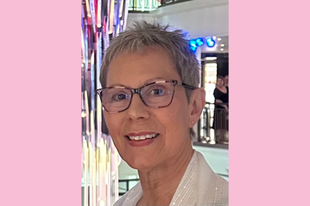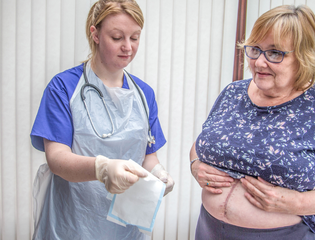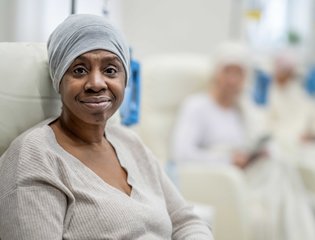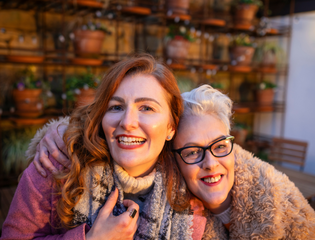Angela: Turning adversity into hope

Angela
At Ovarian Cancer Action, we know the impact of ovarian cancer extends beyond physical health. The impact of treatment on patients' mental health can be challenging, however Angela used her experience to help other through their journey by becoming a chemo buddy for women. Here she tells us her story.
“It was a few days before my 72nd birthday that I felt the firmness in my lower abdomen. My heart sank.”
Just before my 72nd birthday, I discovered a firm mass in my lower abdomen. My heart sank. Having had a hysterectomy at the age of 30, I wasn’t sure what it could be. My doctor quickly confirmed his suspicions and not wanting to wait 2 weeks for a scan, I opted for a private ultrasound. The radiologist confirmed my fears: a 20cm mass. My husband and I cried together before he called our children. It was the beginning of a journey that would test me in ways I never imagined, but ultimately, it led me to a new purpose.
Diagnosis moved swiftly. At my local hospital, my oncologist informed me I would travel and undergo surgery at Hammersmith Hospital. Little did I know I was about to be treated by one of the country’s top specialists, Professor Christina Fotopoulou. During uncertainty, I felt incredibly fortunate. After our consultation, I was eager to proceed with surgery first - I couldn’t wait to get this ‘thing’ out. Since I was in relatively good health, she agreed.
I was diagnosed as High Grade Serous Ovarian Cancer (HGSOC) 3c.
The surgery was extensive, removing my ovaries, omentum, part of my diaphragm, and scraping other organs.
The recovery was difficult. Seeing the ‘zip’ of 37 staples from my breastbone to pubic bone was shocking. Standing upright was difficult, but I focused on healing, step by step.
“The chemo was tough, but I found strength I didn’t know I had.”
Chemotherapy followed at a hospital closer to home. Due to post-Covid restrictions, I had to go through it alone, no visitors allowed. It was challenging.
The chemo treatment itself was do-able, and I coped quite well.I dealt with losing my hair by wearing turbans but the loss of my eyebrows and lashes upset me more.
I surprised myself at the end of the last treatment by bursting into tears! I had an immediate feeling of being adrift in an ocean; of course, it wasn’t like that. Thankfully, a wonderful cancer care nurse reassured me that I was never alone.
Life after treatment was different. I was not cured, but I was here, living with cancer. My senses felt heightened. I now appreciated the simple joys in life more than ever.
“Life is sweeter than ever.”
My oncologist discussed a follow-up maintenance treatment, Niraparib, but after careful thought, I decided against it. At my age, I wanted to focus on quality of life, being vigilant, and keeping up with regular blood tests.
My advice to anyone facing an ovarian cancer diagnosis? It is not a death sentence. There are treatment options, and ongoing research is making progress every day. Avoid frightening yourself with internet searches—Google can be overwhelming. Instead, seek reliable support, like Ovacome, and take things one day at a time. Eat well, stay active, and most importantly, listen to your body.
Giving Back: Finding Purpose as a ‘Buddy’
“Becoming a 'Buddy' has given my life new meaning.”
During chemotherapy, Covid restrictions meant volunteers weren’t allowed in the treatment rooms. The nurses had so much to do, juggling patient care with serving drinks and food. When I finished my own treatment, I knew I wanted to help others facing the same journey.
I became a ‘Buddy’ at the Stoke Mandeville Chemo Room. Just one morning a week, I welcome patients, take their tea and coffee orders, and make sure they feel comfortable. More importantly, I sit with them, listen to them if they want to talk, and share my own experience when it feels right. We also have time to share a laugh together as they become “regulars”, and I see the relief in their eyes when they realise they’re not alone.
The patients' appreciation is wonderful. Being a ‘Buddy’ has given me a sense of privilege to be able to help. Cancer tried to take something from me, but in giving back, I found a way to help others through their journey.
Now, I go for check-ups and blood tests every six months. I stay informed about the latest advancements in ovarian cancer research because I know recurrence is a possibility.
Want to use your story to help shape ovarian cancer research?
The journey with ovarian cancer doesn’t end when treatment does. Join our patient network to create an impact on ovarian cancer research. This is for anyone who has or had any type of ovarian cancer.


